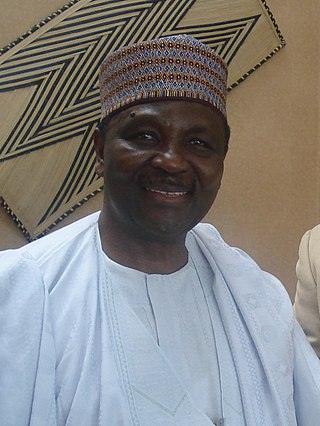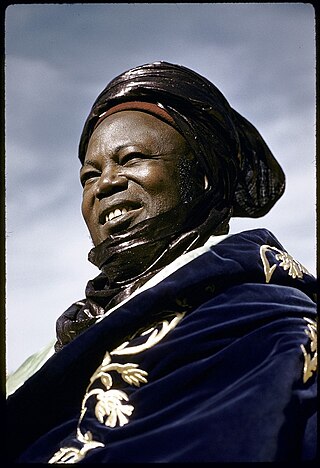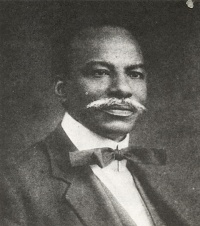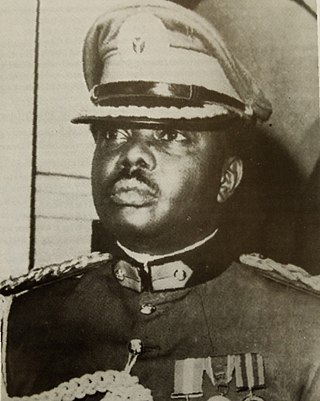Frequent persons on Nigeria's street signs
countries
13 names / 37 streets
Abubakar Tafawa Balewa
 5
Sir Abubakar Tafawa Balewa was a Nigerian politician who served as the first and only prime minister of Nigeria upon independence. A conservative Anglophile, he favoured maintaining close ties with...
5
Sir Abubakar Tafawa Balewa was a Nigerian politician who served as the first and only prime minister of Nigeria upon independence. A conservative Anglophile, he favoured maintaining close ties with...
Yakubu Gowon
 4
Yakubu Dan-Yumma "Jack" Gowon is a retired Nigerian army general and military leader. As head of state of Nigeria, Gowon presided over a controversial Nigerian Civil War and delivered the famous "no...
4
Yakubu Dan-Yumma "Jack" Gowon is a retired Nigerian army general and military leader. As head of state of Nigeria, Gowon presided over a controversial Nigerian Civil War and delivered the famous "no...
Obafemi Awolowo
Raymond Njoku
 3
Raymond Amanze Njoku was a Nigerian politician and former minister for Transport. The son of an Igbo Chief, he was born in Owerri and raised in a Roman Catholic household. He attended Our Lady's...
3
Raymond Amanze Njoku was a Nigerian politician and former minister for Transport. The son of an Igbo Chief, he was born in Owerri and raised in a Roman Catholic household. He attended Our Lady's...
Ibrahim Taiwo
 3
Ibrahim Taiwo was a Military Governor of Kwara State from July 1975 to February 1976 during the military regime of General Murtala Mohammed.
He assisted in establishment of the University of Ilorin,...
3
Ibrahim Taiwo was a Military Governor of Kwara State from July 1975 to February 1976 during the military regime of General Murtala Mohammed.
He assisted in establishment of the University of Ilorin,...
Ahmadu Bello
 3
Ahmadu Ibrahim Bello, famously known as Sardauna of Sokoto KBE, knighted as Sir Ahmadu Bello, was a conservative Nigerian statesman who masterminded Northern Nigeria through the independence of...
3
Ahmadu Ibrahim Bello, famously known as Sardauna of Sokoto KBE, knighted as Sir Ahmadu Bello, was a conservative Nigerian statesman who masterminded Northern Nigeria through the independence of...
Adetokunbo Ademola
 3
Omoba Sir Adetokunbo Adegboyega Ademola SAN was a Nigerian jurist who was the Chief Justice of Nigeria from 1958 to 1972. He was appointed as Chief Justice on 1 April 1958, succeeding Sir Stafford...
3
Omoba Sir Adetokunbo Adegboyega Ademola SAN was a Nigerian jurist who was the Chief Justice of Nigeria from 1958 to 1972. He was appointed as Chief Justice on 1 April 1958, succeeding Sir Stafford...
Herbert Macaulay
 2
Olayinka Herbert Samuel Heelas Badmus Macaulay was a Nigerian nationalist, politician, surveyor, engineer, architect, journalist, and musician and is considered by many Nigerians as the founder of...
2
Olayinka Herbert Samuel Heelas Badmus Macaulay was a Nigerian nationalist, politician, surveyor, engineer, architect, journalist, and musician and is considered by many Nigerians as the founder of...
Moshood Abiola
 2
Chief Moshood Kashimawo Olawale Abiola, also known as M. K. O. Abiola was a Nigerian businessman, publisher, and politician. He was the honorary supreme military commander of the Oyo Empire and an...
2
Chief Moshood Kashimawo Olawale Abiola, also known as M. K. O. Abiola was a Nigerian businessman, publisher, and politician. He was the honorary supreme military commander of the Oyo Empire and an...
Murtala Muhammed
 2
Murtala Ramat Muhammed ; 8 November 1938 – 13 February 1976) was a Nigerian general who led the 1966 Nigerian counter-coup in overthrowing the Johnson Aguiyi-Ironsi military regime and featured...
2
Murtala Ramat Muhammed ; 8 November 1938 – 13 February 1976) was a Nigerian general who led the 1966 Nigerian counter-coup in overthrowing the Johnson Aguiyi-Ironsi military regime and featured...
Kofo Abayomi
 2
Sir Kofoworola Adekunle "Kofo" Abayomi, KBE was a Nigerian ophthalmologist and politician. He was one of the founders of the nationalist Nigerian Youth Movement in 1934 and went on to have a...
2
Sir Kofoworola Adekunle "Kofo" Abayomi, KBE was a Nigerian ophthalmologist and politician. He was one of the founders of the nationalist Nigerian Youth Movement in 1934 and went on to have a...
Aminu Kano
 2
Mallam Aminu Kano was a Nigerian radical opposition political leader, teacher, poet, playwright, and trade unionist from the northern city of Kano. He played an active role during the transition from...
2
Mallam Aminu Kano was a Nigerian radical opposition political leader, teacher, poet, playwright, and trade unionist from the northern city of Kano. He played an active role during the transition from...
Shehu Shagari
 2
Shehu Usman Aliyu Shagari was a Nigerian politician who was the first democratically elected president of Nigeria, after the transfer of power by military head of state General Olusegun Obasanjo in...
2
Shehu Usman Aliyu Shagari was a Nigerian politician who was the first democratically elected president of Nigeria, after the transfer of power by military head of state General Olusegun Obasanjo in...